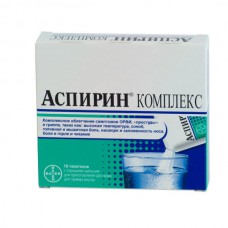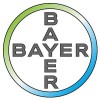Expiration date: 05/2026
The composition and form of issue:
Powder effervescent for solution preparation for intake on 1 Pak.
acetylsalicylic acid 500 mg
fenilafrina bitartrate 15, 58 mg
chlorpheniramine maleate 2 mg
excipients: citric acid anhydrous, sodium hydrogen carbonate lemon flavour quinoline yellow dye
bags made of paper laminated with polyethylene, 3547, 5 mg in cartons of 10 sachets.
Description pharmaceutical form:
Melkoprosejannyj powder from almost white to white with a yellowish tint.
Description pharmacological action:
Combined drug action is due to its active components.
Acetylsalicylic acid has analgesic, antipyretic, anti-inflammatory effect due to inhibition of the COX enzymes involved in the synthesis of PG. Acetylsalicylic acid inhibits platelet aggregation by blocking synthesis of thromboxane A2.
Phenylephrine is a sympathomimetic and having a vasoconstrictor effect, reduces swelling of the mucous membranes of the sinuses, resulting in easier breathing.
Chlorpheniramine belongs to the group of antihistamine that relieves symptoms like sneezing and watery eyes.
Indications:
For the relief of symptoms of colds, SARS, flu, fever, chills, headache and muscle pain, runny nose and/or nasal congestion, sore throat and sneezing.
Contraindications:
- hypersensitivity to acetylsalicylic acid and other NSAIDs or other components of the drug
- erosivno-azwenne defeat of the gastrointestinal tract (in acute phase)
- chronic or relapsing course of ulcer disease
- asthma caused by ingestion of salicylates or other NSAIDs
- such blood clotting, like hemophilia, hypoprothrombinemia
- severe violations of the liver and/or kidney
- nasal polyposis associated with asthma and intolerance to acetylsalicylic acid
- hypertension
- angina
- enlargement of the thyroid gland
- the combined use of oral anticoagulants
- the combined use with MAO inhibitors, including 15 days after the termination of their employment
- combined use of methotrexate in a dose of 15 mg per week or more
- urinary retention
- pregnancy (I and III trimester)
- the period of breastfeeding.
The agent is not appointed children up to 15 years with acute respiratory diseases caused by viral infections, because of the risk of Reye's syndrome (encephalopathy and acute fatty degeneration of the liver with acute hepatic insufficiency).
With caution:
- in diseases of the lungs and kidneys
- glaucoma
- pheochromocytoma
- cardiovascular diseases
- diabetes
- prostatic hypertrophy
- anemia.
Application of pregnancy and breast-feeding:
Contraindicated in pregnancy (during the I and III trimesters). At the time of treatment should stop breastfeeding.
Side effects:
Sometimes it is possible to:
Acetylsalicylic acid
Body as a whole: hyperhidrosis.
From the digestive tract: nausea, dyspepsia, vomiting, gastric ulcer and duodenal ulcer, gastrointestinal bleeding, including hidden (the black chair).
Allergic reactions: urticaria, asantemanso skin rash, angioedema (Quincke's edema) runny nose, bronchospasm and shortness of breath
From blood system: hypoprothrombinemia.
From the Central nervous system and sensory organs: dizziness, tinnitus, headache, hearing loss.
From the side of urinary system: renal failure, acute interstitial glomerulonephritis.
In rare cases (<1%) — toxic liver damage, especially in patients with juvenile rheumatoid arthritis anemia, Reye's syndrome in children.
Phenylephrine
From the Central nervous system and sensory organs: headache insomnia, nausea, excitability, anxiety, dry mouth. In rare cases, severe headache, inappropriate behavior.
Of the cardiovascular system: rarely- increased blood pressure, tachycardia.
From the side of urinary system: rarely — painful or difficult urination.
Chlorpheniramine
Body as a whole: dry mouth dry mucosa of nose and mouth, disturbance of accommodation (blurred vision).
From the side of cardiovascular system: tachycardia.
On the part of the digestive tract: constipation.
From the side of urinary system: urinary retention, difficulty and pain when urinating.
From the Central nervous system and sensory organs: impaired attention, drowsiness, dizziness. In children and elderly patients, possible lethargy, agitation, dizziness, anxiety, irritability.
When any adverse reactions should stop taking the drug and consult a doctor.
Drug interactions:
Acetylsalicylic acid
Ethyl alcohol, cimetidine and ranitidine while the use of acetylsalicylic acid increased its toxicity.
Heparin and indirect anticoagulants. At simultaneous application with acetylsalicylic acid increases the risk of bleeding by inhibition of platelet function, displace anticoagulants from binding to blood plasma proteins and gipoprotrombinemii.
Corticosteroids increase the risk of secondary damage to the mucosa of the gastrointestinal tract.
Combined with zidovudine increase the toxic effects of zidovudine and aspirin.
Acetylsalicylic acid reduces the absorption of NSAIDs (indomethacin, fenoprofen, naproxen, flurbiprofen, ibuprofen, diclofenac, piroxicam).
Increases the concentration of phenytoin because of its displacement from protein binding.
Enhances hypoglycemic effect of antidiabetic drugs and insulin due to the fact that acetylsalicylic acid in high doses has hypoglycemic properties and displace sulfonylureas from binding with blood plasma proteins.
Enhances the ototoxic effect of vancomycin.
Enhances the action of methotrexate by reducing renal clearance and ousting him from the protein binding.
Salicylates reduce the uricosuric effect of probenecid and sulfinpirazon due to the competitive tubular elimination of uric acid.
Phenylephrine
MAO inhibitors (antidepressants — tranylcypromine, moclobemide antiparkinsonian drugs selegiline). While the use of fenilafrinom may develop severe side effects such as intense headache, increase in blood pressure and body temperature.
Beta-blockers. While the use of fenilafrinom may increase blood pressure (hypertension) and severe bradycardia.
The sympathomimetics. While the use of fenilafrinom the influence of sympathomimetics on the Central nervous system and cardiovascular system. Possible excitation, irritability, insomnia.
Inhalation anesthetics. Application fenilefrina before performing inhalation anesthesia increases the risk of rhythm disturbances of heart contractions. Discontinue treatment fenilafrinom several days before scheduled surgical treatment.
Alkaloids of rauwolfia. While the use of fenilafrinom may decrease its therapeutic effect.
Caffeine. While the use of fenilafrinom may increase the therapeutic and toxic effects of caffeine.
Indomethacin, bromocriptine. In rare cases, while the use of fenilafrinom possible severe arterial hypertension.
SSRIs. While the use of antidepressants (fluvoxamine, paroxetine, sertraline) may increase as the body's sensitivity to sympathomimetics and increased risk of serotonergic effects.
Reduces the hypotensive effect of these antihypertensive drugs from the group of simpatolitikov as reserpine, guanetidina.
Chlorpheniramine
Alcohol, sleeping pills, tranquilizers, antipsychotic drugs (neuroleptics), analgesics of Central action. Chlorpheniramine may enhance their inhibitory effect on the Central nervous system.
Anticholinergic drugs — atropine, antispasmodics, tricyclic antidepressants, MAO inhibitors, anti-Parkinsonian drugs. Chlorpheniramine enhances their anticholinergic action.
Method of application and dose:
Inside, after eating, after dissolving the contents of the sachet in a glass of water at room temperature.
Adults and children over 15 years: 1 pack. every 6-8 hours Maximum daily dose — 4 pack., the interval between meals preparation shall be not less than 6 hours.
The duration of treatment without consulting a doctor should not exceed 5 days when administered in an analgesic and 3 days as an antipyretic.
Overdose:
Symptoms: nausea, vomiting, ringing in the ears, poor hearing and vision, shortness of breath, severe headache, impaired balance, severe drowsiness, disturbance of heart rhythm.
Treatment: gastric lavage, the appointment activated carbon, symptomatic therapy.
Precautions:
Acetylsalicylic acid can cause bronchospasm, bronchial asthma attacks or other hypersensitivity reactions. Risk factors are the presence of asthma, nasal polyps, fever, chronic bronchopulmonary diseases, cases of Allergy history (allergic rhinitis, skin rash).
Acetylsalicylic acid may increase the tendency to bleed due to an inhibitory effect on platelet aggregation. This should be considered if necessary, surgical interventions, including small intervention like removing teeth. Before surgery to minimize bleeding during the operation and postoperative period should stop taking the drug for 5-7 days and notify the physician.
The kids aren't allowed to prescribe drugs containing acetylsalicylic acid, as in the case of a viral infection increases the risk of Reye's syndrome. Symptoms of Reye's syndrome are prolonged vomiting, acute encephalopathy, enlarged liver.
During treatment is not recommended to consume alcohol because of the increased risk of side effects from the gastrointestinal tract associated with ingestion of aspirin, and enhance the sedative effect hlorfeniramina.
Due to the fact that the application of chlorpheniramine may change the indices of skin Allergy tests, it is recommended to inform the doctor about the use of the drug and cancel it 3 days before the skin samples.
During treatment is not recommended to use anesthetics, sympathomimetics, guanetidin, and beta-blockers.
It is not recommended to take the drug systematically and prophylactic prior to vaccination.
In renal insufficiency with the low level of albumin in plasma increases the risk of toxic effect of the drug.
Special instructions:
Patients, limiting salt intake, should be aware that each sachet contains sodium bicarbonate.
The active ingredient phenylephrine, which is part of the drug, can cause a positive result when conducting doping test in athletes.
Aspirin Complex may cause drowsiness and therefore impair the ability to control the car and moving mechanisms.


